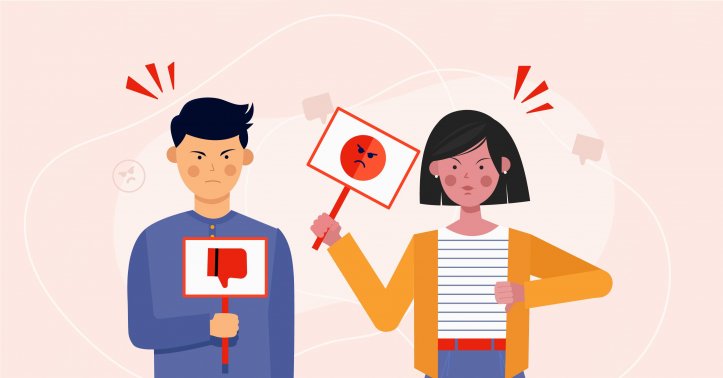
Preventing trolling
Preventing trolling is a multi-layered challenge that requires strategies for individuals, communities, and platforms. There is no single solution, but a combination of methods can drastically reduce its frequency and impact.
Here’s a breakdown of how to prevent trolling from different perspectives:
1. For Individuals: How to Protect Yourself and Respond
This is the first line of defense. Your reaction is often what the troll is seeking.
-
Don't Feed the Trolls (The Golden Rule): This is the most important advice. Trolls thrive on attention, anger, and frustration. Any response—even a negative one—is a reward for them. Ignoring them is the most effective way to win.
-
Use Block and Report Functions Liberally: Don't engage in a debate. If someone is being abusive, block them immediately and report their content to the platform. This removes their ability to interact with you and alerts moderators.
-
Protect Your Personal Information: Be careful about what you share publicly. The less ammunition a troll has (your real name, location, workplace, etc.), the harder it is for them to target you effectively.
-
Strengthen Your Privacy Settings: On social media, limit who can comment on your posts, send you messages, or tag you.
-
Don't Take it Personally: Remember that trolling is a reflection of the troll's issues, not your worth. They are often trying to provoke a specific emotional response from anyone who fits a certain profile.
-
Walk Away and Take a Break: If a troll gets to you, the healthiest response is to log off. Go for a walk, talk to a friend, or do something else you enjoy. Letting it ruin your day is what they want.
2. For Community Managers & Moderators
If you run a forum, subreddit, Facebook group, or game server, your role is critical.
-
Establish Clear, Enforced Rules: Create simple, unambiguous community guidelines. For example: "No personal attacks," "No hate speech," "No spamming." Pin these rules where everyone can see them.
-
Be Present and Act Swiftly: Active moderation is key. When a troll appears, warn them or ban them quickly according to your rules. A slow response allows toxicity to fester.
-
Implement a Graduated Response System:
-
First offense: A warning and removal of the comment.
-
Second offense: A temporary ban (e.g., 24 hours).
-
Third offense: A permanent ban.
-
Use Technical Tools:
-
Automated Filters: Set up filters to automatically flag or hold for review comments containing common slurs or offensive keywords.
-
Slow Mode: In chat rooms or live streams, implement a "slow mode" that limits how often a user can post.
-
Approval for New Members: For private groups, require new members to be approved by a moderator before they can post.
-
Karma/Reputation Systems: Require users to have a certain positive reputation before they can post in certain areas.
-
Empower Trusted Users: Appoint trusted community members as moderators to help you manage the volume.
3. For Platform & Website Designers
The architecture of a platform can either encourage or discourage trolling.
-
Remove Anonymity (Strategically): While anonymity is important for free speech, it also enables trolling. Solutions include:
-
Persistent Identity: Requiring a verified phone number or a main social account to create a profile.
-
Real-Name Policies (with caution): Used by platforms like Facebook, though this has privacy trade-offs.
-
Design for Civility:
-
Upvote/Downvote Systems: Let the community surface good content and bury bad content (like on Reddit).
-
Positive Reinforcement: Reward positive behavior with badges, points, or special statuses.
-
Forced Reflection: Platforms like Instagram have tested prompts that ask users "Are you sure you want to post this?" if their comment contains offensive language.
-
Advanced AI and Machine Learning: Invest in systems that can proactively identify and flag toxic behavior, hate speech, and coordinated trolling campaigns before they ever reach a large audience.
-
Transparent and Consistent Enforcement: Publish clear transparency reports and ensure that rules are enforced consistently for all users to build trust.
4. The Societal & Educational Level
This is the long-term, most fundamental solution.
-
Promote Digital Literacy and Empathy: Teach children (and adults) from an early age about responsible digital citizenship. This includes:
-
The real-world impact of online words.
-
How to engage in constructive disagreement.
-
Critical thinking skills to identify misinformation and troll bait.
-
Foster a Culture of Accountability: Shift the cultural norm from "it's just the internet" to "your online actions have consequences." This happens through education, public discourse, and platform policies.
Understanding Why People Troll
To prevent it, it helps to understand the motives, which often include:
-
Boredom and a desire for entertainment.
-
A sense of power and control.
-
Seeking attention and notoriety.
-
Revenge or frustration.
-
The online disinhibition effect (anonymity makes people feel less accountable).
There is no magic wand to eliminate trolling completely, as it's a complex human behavior. However, by combining individual resilience, proactive community management, intelligent platform design, and long-term education, we can create online spaces that are far more resistant to it and much more enjoyable for everyone.
By Jamuna Rangachari








